What to Know
Can Poodles swim? This is a common question that many dog owners ask themselves. Poodles are known for their elegance, intelligence, and agility, but can they also swim? The answer is a resounding yes! Poodles are excellent swimmers and love to be in the water. They were originally bred in Germany to hunt ducks, so swimming is in their DNA.
Understanding the Poodle breed is important when it comes to their swimming abilities. Poodles come in three sizes: Standard, Miniature, and Toy. Each size has unique physical traits that affect their swimming abilities. For example, Standard Poodles have longer legs and a more athletic build, making them excellent swimmers. Miniature and Toy Poodles, on the other hand, have shorter legs and a smaller build, making them less efficient swimmers. However, with proper training and safety measures, all Poodles can enjoy swimming and benefit from it.
Can Poodle Swim?
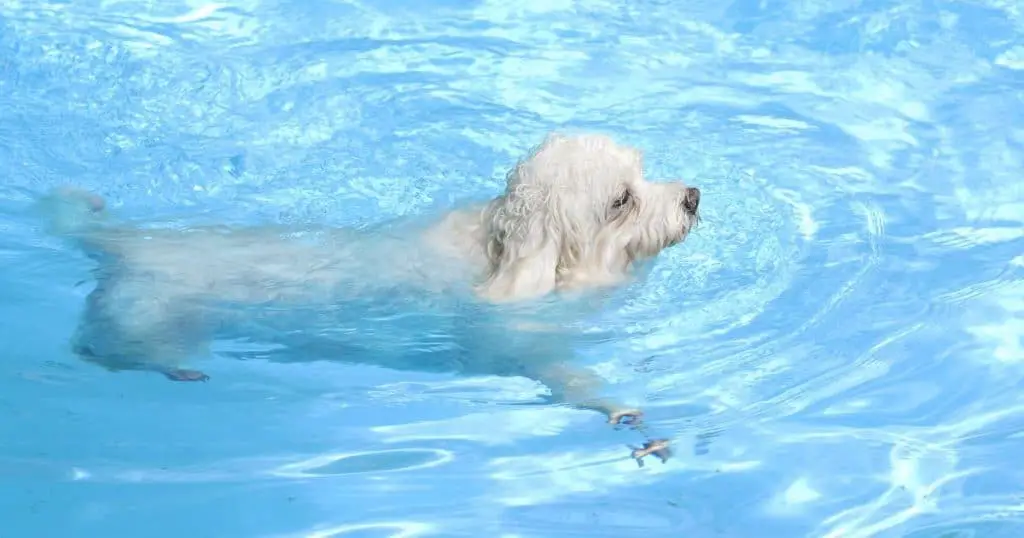
- Poodles are excellent swimmers and were originally bred to hunt ducks in Germany.
- Understanding the physical traits of each Poodle size is important when it comes to their swimming abilities.
- With proper training and safety measures, all Poodles can enjoy swimming and benefit from it.
Understanding the Poodle Breed

Poodles are a highly intelligent and elegant breed of dog that comes in three sizes: standard, miniature, and toy. They are known for their curly, hypoallergenic coat and their graceful gait. Poodles are a popular breed among dog lovers due to their friendly personality, trainability, and versatility.
The Poodle breed originated in Germany, where they were used as water retrievers. Their webbed feet and waterproof coat make them excellent swimmers. Poodles were also used as hunting dogs, circus performers, and even as guide dogs for the blind.
Poodles have a unique DNA structure that sets them apart from other dog breeds. They are known for their curly coat, which is caused by a genetic mutation. This mutation also affects the shape of their skull, giving them a distinctive appearance.
One of the most notable characteristics of the Poodle breed is their intelligence. They are ranked as the second most intelligent breed of dog, behind only the Border Collie. Poodles are quick learners and are highly trainable. They excel in obedience and agility competitions and are often used as therapy dogs due to their friendly and calm demeanor.
Despite their elegant appearance, Poodles are also known for their playful and energetic personality. They love to play and are great with children. They are also known for their loyalty and make excellent family pets.
When it comes to swimming, Poodles are natural water dogs. Their webbed feet and waterproof coat make them excellent swimmers. They are often used in water rescue operations due to their swimming ability.
In conclusion, Poodles are a unique and versatile breed of dog that has many admirable traits. They are highly intelligent, trainable, and friendly, making them excellent family pets. Their love of water and swimming ability makes them a great choice for those who enjoy water activities.
Historical Background of Poodles
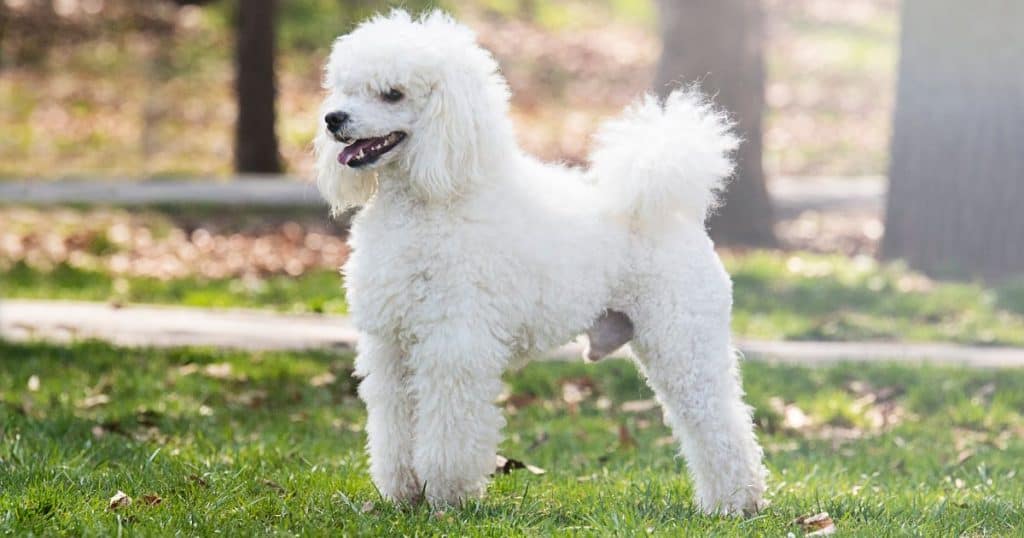
Poodles have a rich history as water retrievers, dating back to the 1500s in Germany. At that time, they were primarily used for hunting ducks and other waterfowl. Poodles were especially well-suited for this task because of their ability to swim and retrieve game from the water with ease.
In fact, the name “Poodle” comes from the German word “Pudel,” which means “to splash in water.” This name is fitting, as Poodles were bred specifically for their swimming ability and were often used to hunt ducks and other waterfowl.
Over time, Poodles became popular in France as well, where they were bred for their elegant appearance and used as companion dogs. However, their history as water retrievers remained an important part of their heritage, and they continued to be used for hunting well into the 20th century.
Poodles are known for their unique coat, which is often styled in a variety of ways. However, their curly, dense fur was actually developed to help them swim more easily. The thick coat helps to insulate the dog’s body in cold water, and the curls help to create a natural buoyancy that makes swimming easier.
Today, Poodles are still accomplished swimmers and are often used in water sports such as dock diving and water retrieving competitions. Their history as water retrievers is an important part of their heritage and has helped to shape the breed into the elegant, athletic dogs that we know today.
Physical Traits and Swimming
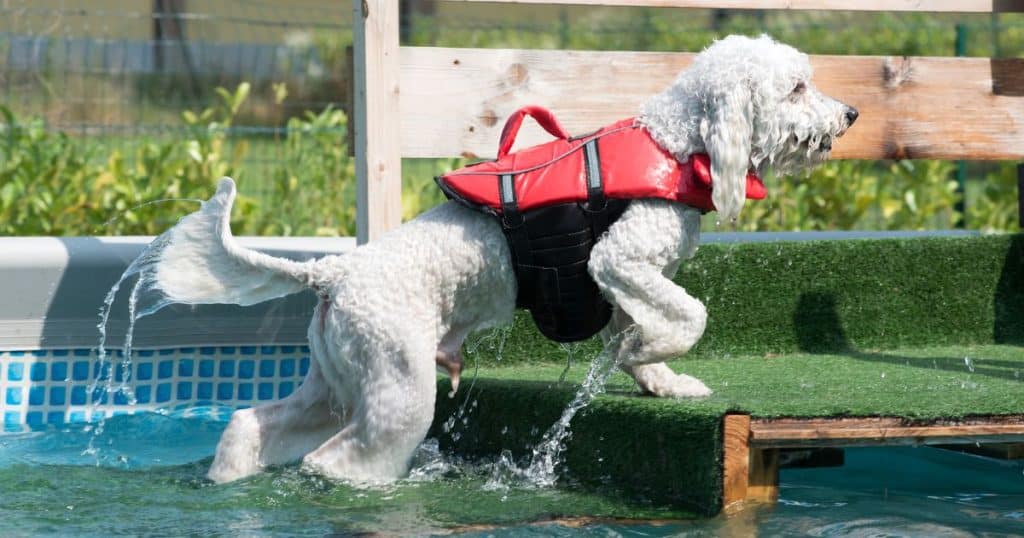
Poodles are known for their unique physical traits that make them excellent swimmers. They were bred with webbed paws, which act as paddles, and a water-resistant coat that helps them stay afloat. Their muscular build and strong tail also aid in propelling them through the water.
The Poodle’s coat is one of its most distinctive features. It is curly and dense, and it can be trimmed in a variety of ways. The coat serves as a natural insulator, keeping the dog warm in cold water. It also helps to repel water, which reduces drag and helps the dog swim more efficiently.
Poodles have webbed feet, which means that the skin between their toes is thicker and more extended than in other dog breeds. This webbing helps them move through the water by providing more surface area for them to push against. The webbing also helps the dog to maintain balance and stability while swimming.
While Poodles have many physical traits that make them excellent swimmers, it is important to remember that not all Poodles enjoy swimming. Some may be afraid of the water or may not have had the opportunity to learn how to swim properly. If you want to teach your Poodle to swim, it is essential to start slowly and gradually introduce them to the water.
In conclusion, Poodles have several physical traits that make them excellent swimmers, including their webbed paws, water-resistant coat, and muscular build. However, not all Poodles enjoy swimming, so it is important to respect your dog’s preferences and never force them into the water. With patience and proper training, you can help your Poodle become a confident and skilled swimmer.
Training Poodles for Swimming
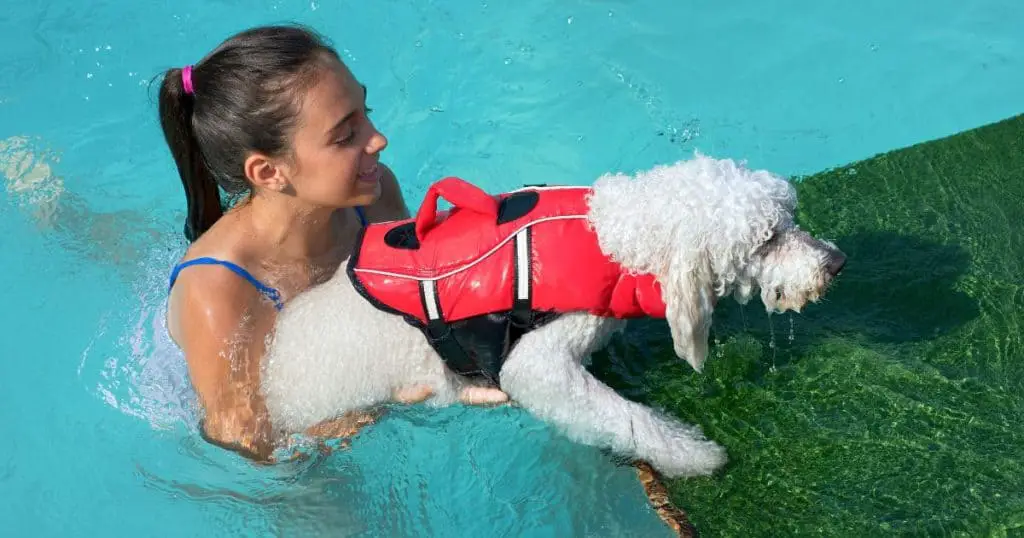
If you’re wondering whether Poodles can swim, the answer is a resounding yes! However, like most dogs, they require training and encouragement to become confident swimmers. In this section, we’ll discuss the steps you can take to train your Poodle to swim and make it a fun experience for both you and your furry friend.
Early Experiences
The earlier you expose your Poodle to water, the better. Puppies are usually more receptive to new experiences, so it’s best to start training them when they’re young. However, if your Poodle is already an adult, don’t worry. You can still teach them to swim with patience and positive reinforcement.
Choose the Right Location
When teaching your Poodle to swim, choose a location with shallow water. A small lake with calm and plain areas is perfect. It’s also better if you can find a place with other dogs so that your Poodle can get company. Start with shallow water and gradually move to deeper water as your Poodle gains confidence.
Positive Reinforcement
Positive reinforcement is essential when training your Poodle to swim. Reward your Poodle with treats and praise when they make progress. Don’t force your Poodle into the water if they’re not comfortable. Instead, encourage them with patience and positive reinforcement.
Use a Life Vest
Using a life vest is an excellent way to help your Poodle feel more comfortable in the water. It provides buoyancy and helps your Poodle stay afloat. A life vest also gives you peace of mind, knowing that your Poodle is safe in the water.
We earn a commission if you click this link and make a purchase at no additional cost to you.
Trust Your Poodle Trainer
If you’re not confident in your ability to train your Poodle to swim, consider hiring a dog trainer. A professional trainer can provide guidance and help you train your Poodle effectively. They can also help you identify any potential problems and provide solutions.
Walking Your Poodle
Walking your Poodle near water can help them become more comfortable with it. Start by walking them near a lake or river and gradually move closer to the water. Let your Poodle sniff and explore the area. Over time, your Poodle will become more comfortable with the water, making it easier to teach them to swim.
In conclusion, teaching your Poodle to swim requires patience, positive reinforcement, and a little bit of training. By choosing the right location, using a life vest, and trusting your Poodle trainer, you can make it a fun and enjoyable experience for both you and your furry friend. With time and progress, your Poodle will become a confident swimmer, ready to explore the water with you.
Safety Measures for Poodle Swimming
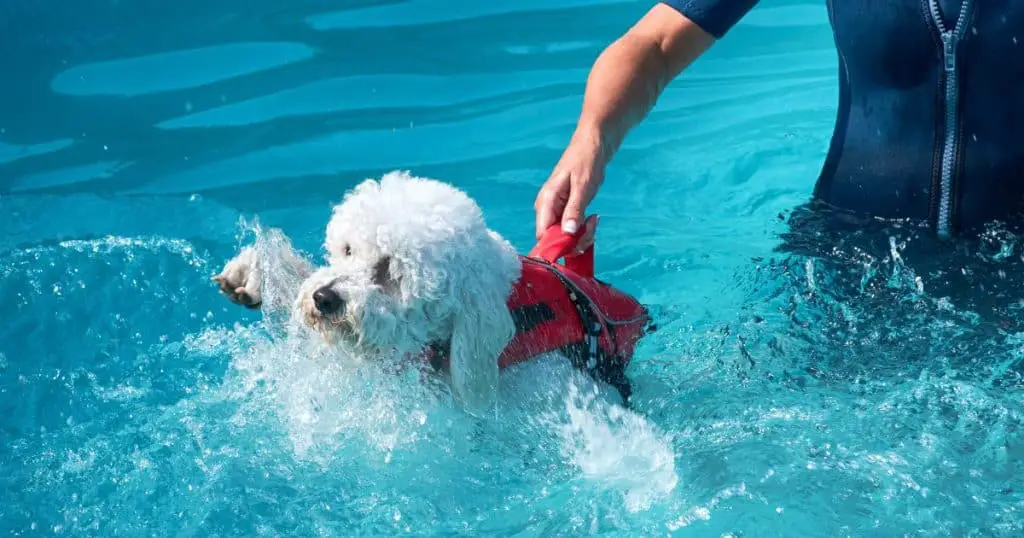
When it comes to swimming, poodles are great swimmers. However, it’s essential to take safety measures to ensure your poodle’s safety while swimming. Even if your poodle has prior swimming experience, it’s still necessary to take precautions to avoid accidents.
One of the first things you should consider is getting a life vest for your poodle. A doggy life vest or a life jacket will help keep your poodle afloat and reduce stress in case of panic or tiredness. Always supervise your poodle while swimming and be alert for any signs of distress.
It’s also important to choose the right location for your poodle to swim. Find a place with shallow water where your poodle can wade in deeper gradually. Avoid areas with strong currents, waves, or underwater obstacles that can pose a risk to your poodle’s safety.
When introducing your poodle to swimming, start slowly and use toys that float to encourage them to swim. Never force your poodle into the water, and always provide support if they need it. Avoid overcrowded swimming areas, and keep your poodle away from boats or other watercraft.
In summary, while poodles are great swimmers, it’s crucial to take safety measures to avoid accidents. Get a life vest, supervise your poodle, choose the right location, start slowly, use toys that float, and avoid overcrowded areas. By following these simple safety measures, you can ensure a fun and safe swimming experience for your poodle.
Health Benefits of Swimming for Poodles
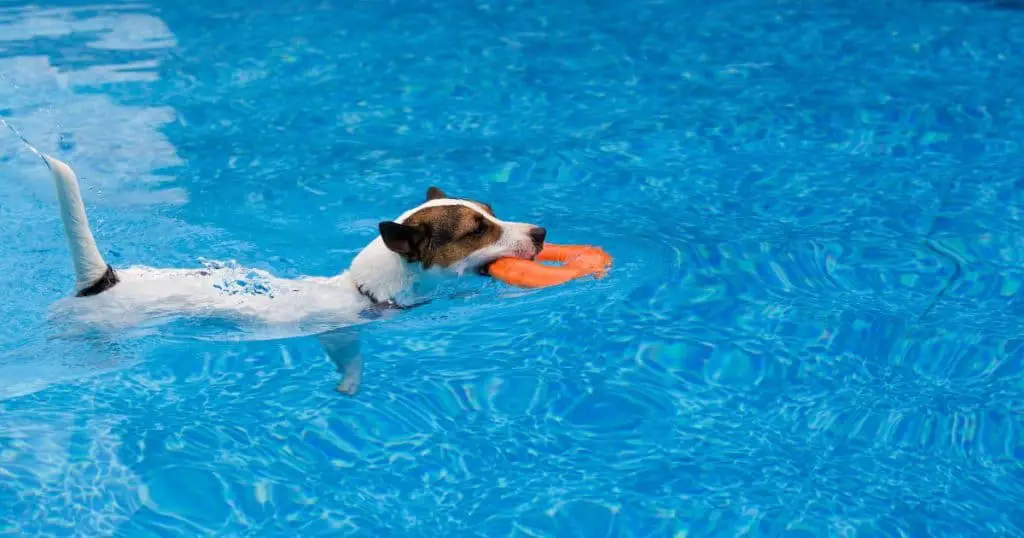
Swimming is a great form of exercise for your furry friend. It is a low-impact activity that is easy on their joints, making it a great option for poodles who may suffer from arthritis or muscle weakness. Swimming can also improve your poodle’s heart health, digestive health, metabolism, and aid in weight loss.
Swimming is great for poodles who suffer from anxiety. It can be a therapeutic and relaxing activity for them, helping to calm their nerves and reduce stress. Additionally, swimming can provide a great bonding opportunity for you and your poodle.
One of the most significant health benefits of swimming for poodles is the strengthening of their muscles. Swimming requires the use of many different muscle groups, making it a great all-around workout. It can also help to improve their balance and coordination.
While swimming is beneficial for poodles of all ages, it is especially important for senior poodles. As they age, they may become less active, leading to a decline in their overall health. Swimming can help to keep them active, maintaining their strength and mobility.
It is important to remember that not all poodles are natural swimmers. Some may need to be taught how to swim, while others may be hesitant to enter the water. If you are unsure if your poodle is a good swimmer, it is best to start with shallow water and gradually work your way deeper.
In conclusion, swimming is a great activity for poodles of all ages. It provides a wide range of health benefits, including improved heart health, digestive health, metabolism, weight loss, and muscle strength. If you have a poodle, consider incorporating swimming into their exercise routine for a happy and healthy furry friend.
Choosing the Right Location for Poodle Swimming
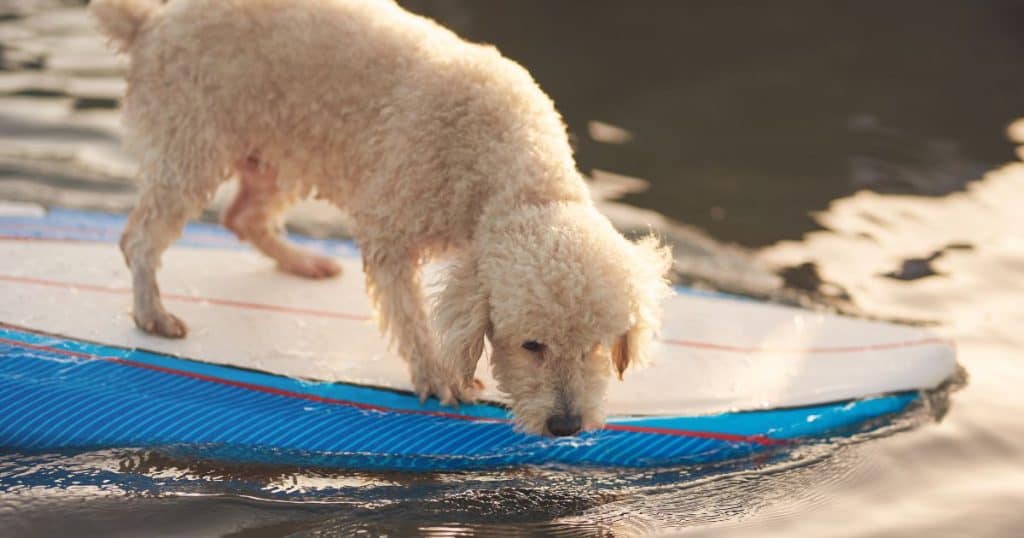
If you’re planning to teach your Poodle how to swim, the first thing you need to consider is the location. Choosing the right location can make all the difference in how well your Poodle adapts to swimming. Here are some tips on how to choose the right location for your Poodle to swim.
Find a Shallow Area
One of the most important things to consider when choosing a location for your Poodle to swim is finding a shallow area. This will allow your Poodle to gradually get used to the water and gain confidence. Shallow areas are also safer for your Poodle to swim in, especially if they are just learning how to swim.
Look for Calm Waters
When choosing a location for your Poodle to swim, it’s important to look for calm waters. Poodles are not the strongest swimmers, so it’s important to avoid areas with strong currents or choppy waters. Calm waters will also help your Poodle feel more comfortable and relaxed in the water.
Consider Natural Bodies of Water
Natural bodies of water, such as lakes and rivers, can be great locations for your Poodle to swim. These areas often have shallow areas and calm waters, making them ideal for Poodle swimming. However, it’s important to be aware of any potential hazards, such as rocks or debris, that could pose a danger to your Poodle.
Avoid Chlorine Pools
While it may be tempting to take your Poodle to a chlorine pool, it’s important to avoid these types of pools. Chlorine can be harsh on your Poodle’s coat and skin, and can also irritate their eyes. If you do decide to take your Poodle to a pool, make sure it’s a saltwater pool or a pool specifically designed for dogs.
By following these tips, you can choose the right location for your Poodle to swim and help them become comfortable and confident in the water. Remember to always supervise your Poodle while they are swimming, and never force them to go too far or too deep in the water. With patience and practice, your Poodle can become a great swimmer and enjoy the water with you!
Grooming Poodles After Swimming
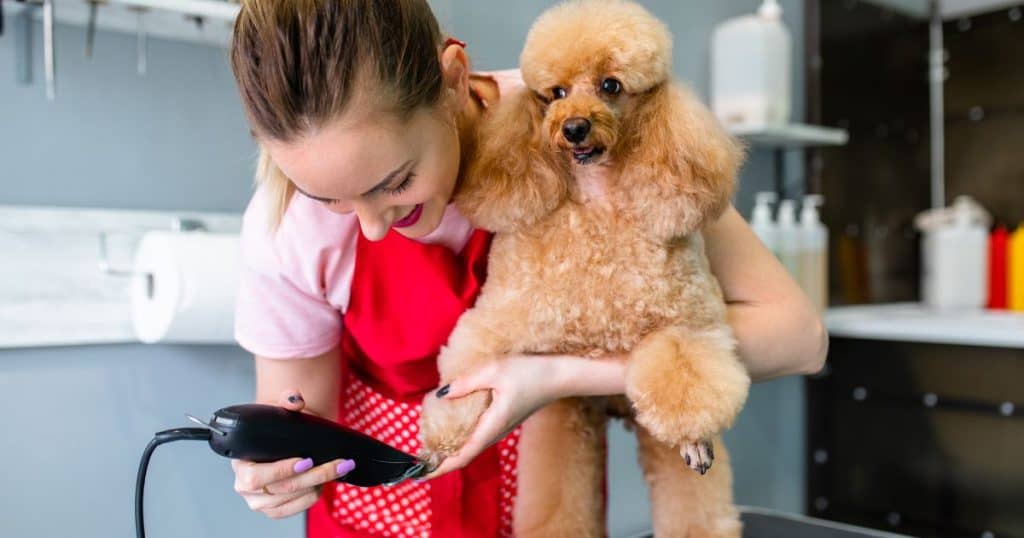
Poodles are known for their waterproof coat, which makes them excellent swimmers. However, after a swim, their coat requires proper grooming to maintain its quality and keep the dog healthy. In this section, we will discuss the grooming process for poodles after swimming.
Brushing
Brushing your poodle’s coat after a swim is essential to prevent matting. Matting occurs when the fur becomes tangled and knotted, which can cause discomfort and even lead to skin infections. Use a slicker brush to remove any tangles and mats gently. If your poodle has long hair, use a comb to detangle the fur.
Bathing
After swimming, your poodle’s coat may have dirt, debris, and chlorine. It is essential to rinse the coat thoroughly to remove all the dirt and chemicals. Use a gentle shampoo to wash the coat and rinse it thoroughly. Make sure to dry the coat completely to avoid any skin infections.
Drying
Drying your poodle’s coat after a swim is crucial to prevent matting and skin infections. Use a towel to remove excess water from the coat and then use a hairdryer to dry the coat completely. Make sure to use a low heat setting and hold the dryer at least six inches away from the coat to avoid any burns.
Trimming
If your poodle has long hair, it is essential to trim the coat regularly to prevent matting. Trimming the coat also helps to maintain its quality and keep the dog healthy. Use a pair of scissors or clippers to trim the coat, and make sure to trim the hair around the ears, paws, and tail.
In conclusion, grooming your poodle after swimming is essential to maintain its quality and keep the dog healthy. Brushing, bathing, drying, and trimming are the essential grooming processes that you should follow after a swim. By following these grooming processes, you can keep your poodle’s coat healthy and prevent any skin infections.
FAQs
Are Poodles natural swimmers?
Poodles are natural swimmers, especially the Standard Poodle. They were originally bred as water retrievers, so they have a natural affinity for the water. However, not all Poodles are born swimmers, and some may need to be taught how to swim.
Do Poodles need to be taught how to swim?
While Poodles are natural swimmers, not all of them are comfortable in the water. Some may need to be taught how to swim. It is important to introduce your Poodle to the water gradually and never force them to swim if they are not comfortable.
What are some ways to introduce Poodles to water?
To introduce your Poodle to water, start by letting them wade in shallow water. Gradually increase the depth of the water as they become more comfortable. You can also use toys or treats to encourage them to swim. It is important to always supervise your Poodle around water and never leave them unattended.
Can Poodles swim in pools?
Yes, Poodles can swim in pools. However, it is important to make sure they have a way to get out of the pool, such as a ramp or steps. Pools can also be dangerous for Poodles if they are not supervised, so it is important to always keep an eye on them.
What are some safety precautions for Poodles around water?
When it comes to Poodles and water safety, it is important to always supervise them around water. Never leave them unattended, even for a few seconds. Make sure they have a way to get out of the water, such as a ramp or steps. It is also important to never force them to swim if they are not comfortable.
Do Poodles enjoy swimming?
Many Poodles enjoy swimming, especially the Standard Poodle. However, not all Poodles are comfortable in the water. It is important to introduce your Poodle to the water gradually and never force them to swim if they are not comfortable.
Remember to always supervise your Poodle around water and never leave them unattended. With patience and proper training, your Poodle can become a confident swimmer.


